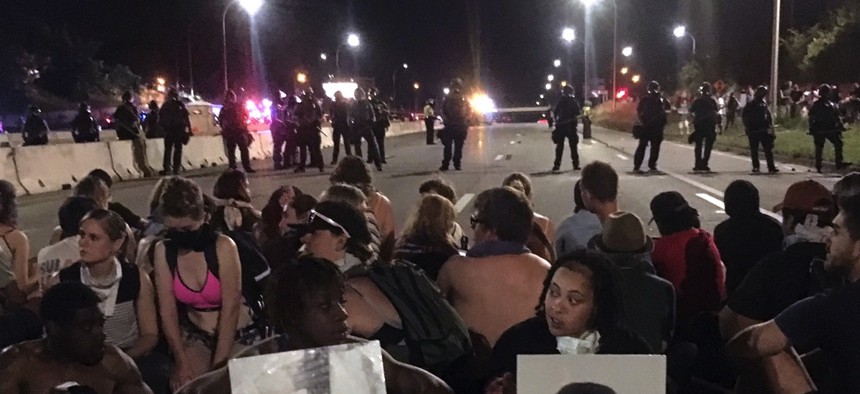The States Trying to Pass Laws Protecting Drivers Who Hit Protesters

Law enforcement form a line across Interstate 94 on Saturday, July 9, 2016, in St. Paul, Minn., in response to protesters who blocked the highway. The protesters were rallying in response to the death of Philando Castile. (AP Photo/Joe Danborn)
After the Charlottesville attack, Republican lawmakers are seeking to distance their efforts to pass driver immunity legislation.
Florida State Senator George Gainer wants to make one thing clear: His bill was never a license to assault demonstrators. While the bill he sponsored in February, S.B. 1096, would have granted civil immunity to drivers who strike protesters with their vehicles, the fatal assault in Charlottesville on Saturday is not what he had in mind.
“It had nothing to do with what was going on in Virginia,” Gainer says. “Our bill would not have prevented that, and it certainly would not have condoned it.”
That bill died in May. But similar bills in four other states (North Carolina, Rhode Island, Tennessee, and Texas) are still on the table, and the bill in North Carolina even passed the House. While their Republican sponsors are walking back some of these proposals in light of the attack in Charlottesville, others are still insisting that they serve drivers and protesters alike.
All of these bills would accomplish roughly the same thing: If a driver strikes a demonstrator on a road or freeway, and the demonstrator doesn’t have a permit to be there, the driver cannot be held liable for any injuries—even death. That’s immunity to civil liability only. Criminal liability would still apply in an intentional vehicular assault or terror attack like the one in Charlottesville.
These bills largely sprung from Black Lives Matter demonstrations last year, several of which featured scenes of protesters occupying highways around the country. The same tactic has been employed in demonstrations to oppose the election and inauguration of President Donald Trump.
That context may have changed after Charlottesville. In North Carolina, The News & Observer reports that the Senate will not take up H.B. 330 after all, and that even if it did, Governor Roy Cooper, a Democrat, would veto it. Still, that didn’t stop North Carolina State House Rep. Justin Burr from issuing a blistering defense of his bill.
"It is intellectually dishonest and a gross mischaracterization to portray North Carolina House Bill 330 as a protection measure for the act of violence that occurred in Charlottesville this past weekend,” Burr said in a statement on Monday. “Any individual who committed a deliberate or willful act, such as what happened this weekend in Charlottesville, would face appropriately severe criminal and civil liabilities.”
But the bills all raise similar questions: In the absence of compelling video evidence, how would law enforcement determine whether a driver who struck a protester did so accidentally or intentionally? For example, the Tennessee bill says that civil immunity will be applied to any driver “who is exercising due care.” (Tennessee lawmakers did not return a request for comment.) The failed Florida bill went further, putting the burden of proof on pedestrians to show that injury or death was intentional.
In that sense, these driver-immunity laws resemble the so-called “stand your ground” laws that many of these same states all share. For both kinds of laws, the burden of proof falls on the person who has suffered the casualty. And race, inevitably, is a determinative factor in establishing whose truth holds up in court.
“We realized we were going into an area that was too complicated,” Gainer says. “We didn’t pursue the bill any further until we could come back and come up with something more specific.”
Texas State Rep. Pat Fallon, the Republican author of Texas’s version of this law, H.B. 3432, says that the legislative process will ultimately clarify several important details. His draft is only a placeholder; the final committee substitute would apply civil immunity for drivers only on roadways with a speed limit of 55 miles per hour or greater, Fallon says, and just in circumstances in which a protester lacks a permit. Other details will follow.
The point is to keep protesters off high-speed highways, not empower drivers on blocked streets to take matters into their own hands. Fallon says that the high speeds of Texas highways, many of which boast posted limits of 80 m.p.h., make them incredibly unsafe for people on the roadway, even if they are in highly visible, large-scale protests. “That’s why we don’t allow hitchhiking,” he says. “We don’t want people on foot deliberately on a roadway like this.”
Fallon says that his goal is to protect protesters. He calls protest crucial to the well-being of a Jeffersonian democracy. But he says that demonstrations on highways are unsafe, both for protesters and for impartial drivers caught up in a tense or confusing situation. Charlottesville doesn’t change that, Fallon says: If anything, it makes the legislation more urgent. “It’s the same kind of thing where we have a tragedy with a gun,” Fallon says. “It doesn’t mean we’re going to outlaw all guns.”
Whether any of these bills will see the light of day is unclear. But they prove one thing: Those highway demonstrations really are effective, in a sense. Lawmakers from all over took notice, even if they did not respond in the ways that activists might have hoped.
Kriston Capps is a staff writer for CityLab, where this article was originally published.
NEXT STORY: Baltimore Mayor’s Advice for Removing Confederate Monuments: ‘Do It Quietly and Quickly’





